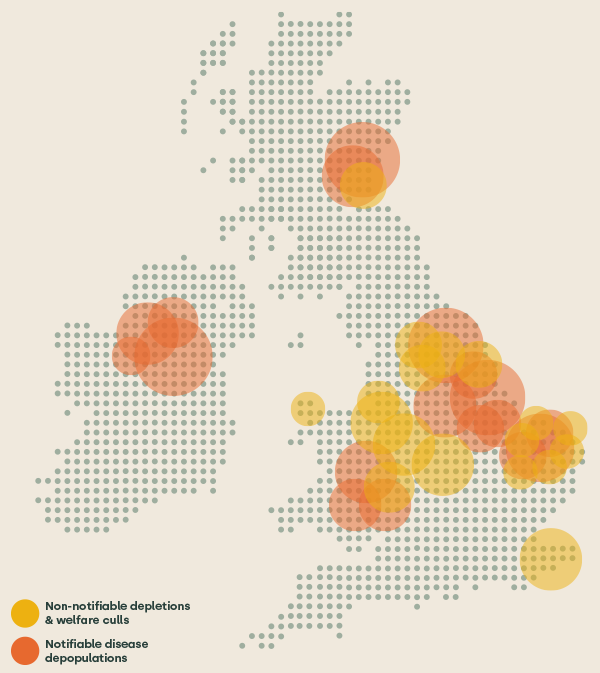We operate across the UK and Ireland
We work alongside major Government and industry bodies, such as APHA, Defra and BPC to ensure that our products and services help farming businesses across the UK and Ireland for welfare culls, notifiable and non-notifiable disease depopulations.
Our bespoke solutions adhere to latest Government legislation and guidance, ensuring you remain compliant as we complete the necessary operations on your farm.
You can proactively reduce the risk of potential financial loss, reputation damage or vulnerabilities in your business with the implementation of Livetec’s tailored biosecurity strategies.


Welfare
When there are operational delays, the welfare of livestock becomes an urgent concern. The inability to cull or move animals off-site as scheduled can quickly create crowded conditions which puts the health, safety, and wellbeing at risk.
At Livetec, our bespoke on-farm operations provide rapid solutions to time sensitive challenges, boosting capacity and capability, as well as filling resource gaps to help manage seasonal demand or the breakdown of your supply chain, reducing stress and maximising efficiency on your schedule.
![]()
Emergency operations
Whatever the situation is that you are facing, we’re proud to offer our expertise as a service, providing emergency operational services to support you and your business.
From extreme weather, such as high temperatures causing heat exhaustion or fires, severe rain, causing flooding or water damage, heavy snowfall and high winds forcing structures to collapse, an urgent disease outbreak either on your farm or if you are within a local surveillance zone, we can help.
![]()

Disease outbreaks
Since 2012, we have been APHA’s leading provider of depopulation services for notifiable diseases. We help farmers to understand the regulations and guidance set out by Government to remain compliant in the event of a disease outbreak.
There are many strains of Avian Influenza, but not all of them need to be controlled by the Government. The different types of AI are broken down into notifiable and non notifiable diseases.
Strains of non-notifiable low pathogenic AI are the responsibility of the farmer to control, so there is no legal requirement to cull the infected birds. However, some strains can recombine to become highly pathogenic and there may still be high mortality, low egg production and a rapid spread.
![]()

Secondary cleansing & disinfection
After APHA or Livetec carries out preliminary cleaning measures, the farm must be closed for 24 hours.
The secondary cleansing and disinfection is the sole responsibility of the farmers. After the preliminary deep clean, farmers are served a notice by APHA, via a EXD23 (AI) with guidelines, works to complete and a strict deadline for completing the second stage before they can start the process of resuming normal operations.




